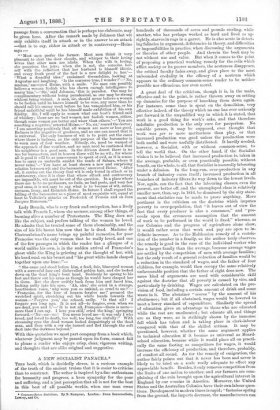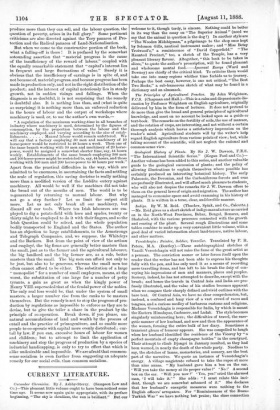A NEW SOCT A LTST PANACEA.*
This book, which is decidedly clever, is a curious example of the truth of the ancient truism that it is easier to criticise than to construct. The writer is inspired by a fine enthusiasm for humanity and progress, a keen sympathy for the poor and suffering, and a just perception that all is not for the best in this best of all possible worlds, when one man owns
• Carnmon.Sonse Socialism. By N. Kempner. London; Swan Bonnenscheio, Lowrey, and Co.
hundreds of thousands of acres and pounds sterling, while another, tvbo has perhaps worked as hard and lived as up- rightly, starves in rags in a garret. He is also acute in detect- ing fallacies in argument, deficiencies in theory, and difficulties or impossibilities in practice, when discussing the arguments or theories of other people. And therein the book may be not without use and value. But when it comes to the point of proposing a practical working remedy for the evils which afflict society or its poorer members, the acuteness disappears, the critical faculty fades away, and gives place to the most unbounded credulity in the efficacy of a nostrum which appears to the ordinary common-sense reader to be neither possible nor efficacious, nor even moral.
A great deal of the criticism, though it is, in the main, effective and to the point, is rather thrown away on setting up dummies for the purpose of knocking them down again. For instance, some time is spent on the demolition, very effective indeed, of the theory which no one has ever seriously put forward in the unqualified way in which it is stated, that work is a good thing for work's sake, and that therefore indefinite production is the only cure for pauperism. No sensible person, it may be supposed, ever thought that work was per as more meritorious than play, or that increased production was good unless the production were both useful and were usefully distributed. It hardly needed, however, a Socialist, with or without common-sense, to tell the world that. On the other hand, if the Socialist wishes it to be believed that increased production is, taken in the average, probable, or even practically possible, without benefit, on the whole, to all, that Socialist is assuredly labouring under a delusion. In the long-run, over-production in any branch of industry cures itself ; increased production in all branches of industry filters its way down to the lowest levels. Nor, again, can the fact that the labouring classes, even the poorest, are better off, and the unemployed class is relatively smaller now, than, say, in 1816, be dismissed by the airy state- ment that statistics can be made to prove anything. More pertinent is the criticism on the doctrine which imputes poverty to over-population, that "it leaves out of view the fact that every producer is also a consumer," and " pro- ceeds upon the erroneous assumption that the amount of work to be performed in the world is fixed," whereas, as our Colonies and the progress of agriculture alone show, it would rather seem that work and pay are open to in- definite increase. As to the Malthusian remedy of a restric- tion of the number in a family, as the author truly observes, the remedy is good in the case of the individual worker who has a larger family than the average, because average wages are settled by the competition of men with average families ; but the only result of a general reduction of families would be a reduction in the standard of wages, and the father of four children, for example, would then occupy the same relatively unfavourable position that the father of eight does now. The same kind of arguments are used with considerable skill against the doctrine that all poverty is caused by vice, and particularly by drinking. Wages are calculated on the pro- vision of food, including a certain amount of drink and some waste in it. The abstainer " scores " by the amount of his abstinence; but if all abstained, wages would be lowered to meet a lower standard of expenditure. Similarly the spread of education gives an advantage to those who are educated while the rest are uneducated ; but educate all, and things are as they were, as is strikingly shown by the immense fall which has taken and is taking place in clerk-labour compared with that of the skilled artisan. It may be questioned, however, whether the same argument applies to technical education if it became as universal as Board- school education, because while it would place all on practi- cally the same footing as competitors for wages, it would increase the efficiency of production, and therefore, probably, of comfort all round. As for the remedy of emigration, the author fairly points out that it never has been and never is likely to be tried on a scale really adequate to effect any appreciable benefit. Besides, it only removes competition from the limits of one nation to another, and our farmers are com- plaining of the ruin brought upon the agricultural interest in England by our cousins in America. Moreover, the United States and the Australian Colonies have their own labour ques- tions. Development in modern times is rapid; "factories spring from the ground, the imports decrease, the manufacturers can
produce more than they can sell, and the labour question, the question of poverty, arises in its full glory." Some pertinent criticisms are also directed against the Tory panacea of Pro- tection and the Radical panacea of Land-Nationalisation. But when we come to the constructive portion of the book, what a falling-off is there It is prefaced by the somewhat astounding assertion that "material progress is the cause of the insufficiency of the reward of labour," coupled with the equally remarkable statement that " capital's interest lies in frequent and large fluctuations of value." Surely it is obvious that the insufficiency of earnings is in spite of, and not because of, material progress, and because progress has been made in production only, and not in the right distribution of the product; and the interest of capital notoriously lies in steady growth, not in sudden risings and fallings. When the diagnosis is so doubtful, it is not surprising that the remedy is doubtful also. It is nothing less than, and (what is quite as surprising) it is nothing more than, an enforced reduction in the hours of labour and the output of workshops where machinery is used, or, to use the author's own words,—
" A regulation of the maximum working-time in all branches of industry where machinery is used, determined by the figures of consumption, by the proportion between the labour and the machinery employed, and varying according to the size of estab-
lishments Manual labour would remain unfettered. We will say that a factory employing 30 men and machinery of 10 horse-power would be restricted to 48 hours a week. Then one of the name branch working with 30 men and machinery of 20 horse- power, would be assigned a somewhat shorter time, say, 44 hours weekly. Establishments of the same branch employing 300 men and 100 horse-power might be restricted to, say, 44 hours, and those working with 300 men and 200 horse-power to 40 hours per week."
Apart from the practical difficulties in the way, which are admitted to be enormous, in ascertaining the facts and settling the scale of regulation, this saving doctrine is really nothing more than a modified version of the Luddite outcry against machinery. All would be well if the machines did not take the bread out of the mouths of men. The world is to be regenerated by returning to manual labour. But why not go a step further P Let us limit the output still more. Let us not only break all our machinery, but discard all our tools. Where ten Irish labourers are em- ployed to dig a potato-field with hoes and spades, twenty or thirty might be employed to do it with their fingers, and so the Irish Question could be solved, and the whole population bodily transported to England and the States. The author has an objection to large establishments, to the Armstrongs and Telegraph Companies, and, we suppose, the Whiteleys and the Barkers. But from the point of view of the artisan and employe, the big firms are generally better masters than the small, just as to the farmer and the agricultural labourer, the big landlord and the big farmer are, as a rule, better masters than the small. The big men can afford not only to be just, but also to be generous, whereas the small men too often cannot afford to be either. The substitution of a large monopolist " for a number of small employers, means, at the worst, the substitution of one large for a number of petty tyrants, a gain as great as when the kingly power of Henry VIII. superseded that of the feudal power of the nobles. The only real loss would be, that under the system of small masters, a larger number rise from the ranks to be masters themselves. But the remedy is not to stop the progress of pro- duction by regulations as impossible to enforce as they are to devise, but to give the toiler a share in the product by the principle of co-operation. Break down, if you please, un- natural accumulations of land and wealth by the process of entail and the practice of primogeniture, and so enable more people to co-operate with capital more evenly distributed ; cur- tail by law, if you can, excessive hours of labour for women and children; but to attempt to limit the application of machinery and stop the progress of production by a species of industrial handicapping, is only to try to effect that which is alike undesirable and impossible. We are afraid that common- sense socialism is even farther from suggesting an adequate remedy for our social evils, than common socialism.



































 Previous page
Previous page